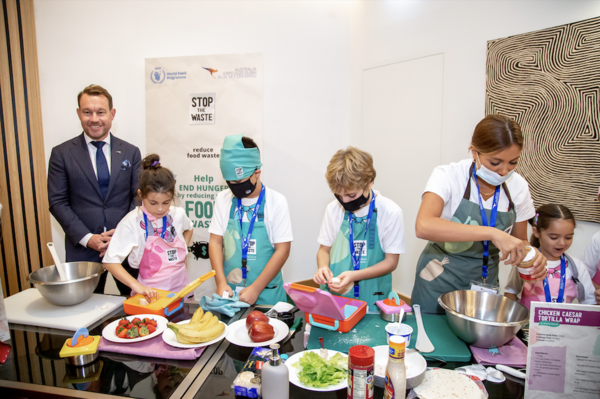Food Waste takes the stage to mark World Food Day at EXPO 2020 - An event by World Food Programme & the Australian Department for Foreign Affairs and Trade

Speakers at the event included: Mr Justin McGowan, Commissioner General EXPO 2020, Australia, Ms. Dena Assaf, UN Resident Coordinator in UAE, Dr. Moez El Shohdi, President & CEO, Food Banking Regional Network and Ms. Caterina Galluzzi, Deputy Director, UN WFP, GCC.
Globally, enough food is produced to feed the world’s 7 billion people, yet 811 million people still go to bed hungry each night. Among the factors that are driving global hunger is the climate crisis. Climate shocks and stresses are destroying lives, crops and livelihoods, and undermining people’s ability to feed themselves. Communities who contribute the least to the climate crisis are bearing the brunt of its impacts with limited means to cushion the blow.
Mr Justin McGowan, Commissioner General EXPO 2020, Australia, said: “The impact of food waste on the environment, as well as human health, cannot be ignored. It’s shocking to think that a quarter of water used in agriculture is used to grow food that is ultimately wasted. Australian science and technology across sustainable agriculture, waste treatment and the creation of value from food waste is contributing to the reduction of food waste across the supply chain.”
Each year the amount of food that is lost or wasted amounts to a financial loss of about US$1 trillion.
“Food that is lost or wasted accounts for some 3 billion tons of unnecessary greenhouse gas emissions – in turn, accelerating the climate crisis and its impact on rising hunger, said Galluzzi. “We need to find solutions that address food losses and waste throughout supply chains around the world and ensure a decrease in world hunger, she added.
Dr. Assaf, stressed on the urgent need to come together in solidarity to ensure food security for all especially with the exacerbating effects of COVID-19. While Dr. El Shohdi inspired the attendees by giving tangible examples on how through its sixty-two food banks, the Food Banking Regional Network is providing meals to around 54 million people every month, bringing together supporters from governments, the private and the HORECA sectors.
The event was supported by Choithrams and included a live cooking activity to showcase how one can repurpose surplus food to avoid food waste. The cook-off was led by Michelin starred Chef Roberto Rispoli from Jumeirah Group, Australian acclaimed Chef, Restaurateur and Top Chef Alumni, Chef Janine Booth, Chef Maya Badran specialized in plant based and food waste friendly cooking, and influencer Mayada Sleiman winner of “Chopped” cooking show, who cooked with participating kids delicious meals for a perfect lunch box, made of leftovers.
During the event, Dubai Eye presenter Helen Farmer sparked a lively discussion with the attendees, and Clinical Dietitian Mitun DeSarkar provided inspiring tips on how we can use excess food, misfits and end of day produce to create nutritious meals for the whole family.
#StopTheWaste is a movement for change launched by the United Nations World Food Programme and aims to spotlight the global issue of food waste and offer a simple solution we can all take to fight hunger by just wasting less food.
One-third of food produced for human consumption is lost or wasted throughout the supply chain, from initial agricultural production to final household consumption.
In developed countries where the infrastructure is solid and the food supply chain is efficient, 40% of food is wasted “after the plate” meaning people are simply buying more food than they can consume.
Through WFP, supporters can efficiently fight hunger by wasting less food and turning their savings from that positive practice into lifesaving food for those who need it most.
Individuals can also start by making small actions daily, such as planning the groceries, mixing leftovers to create your next meal, using everything your food can offer, like potato peels to make chips, or using bones to create a delicious and nutritious broth.
For more information, please visit us at: www.wfp.org/foodwaste .
About the UN World Food Programme
The United Nations World Food Programme is the 2020 Nobel Peace Prize Laureate. We are the world’s largest humanitarian organization, saving lives in emergencies and using food assistance to build a pathway to peace, stability and prosperity for people recovering from conflict, disasters, and the impact of climate change.
Follow us on Twitter @WFP_GCC – Instagram: @WFP_MENA
Topics
United Arab EmiratesContact
Zeina Habib
Head of Communications & Engagement
The UN World Food Programme – GCC
Mob: +971 551476547; Zeina.habib@wfp.org
